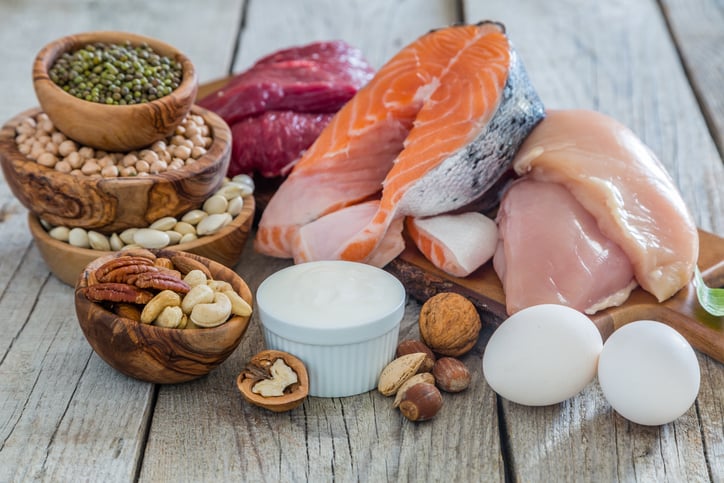The Best Diet to Meet Your New Year’s Resolution Goals

I’m going to come right out and say it: By and large, diets DON’T work. Now that I’ve got your attention, please allow me to clarify before you leave the page, or worse, send hate mail. Reduced-calorie diets are extremely effective, if not necessary, when it comes to short-term weight loss. However, those very same diets have a notoriously abysmal track record when it comes to long-term weight maintenance.1
And that’s what you’re really after, right? I mean, I don’t know too many people who are proud to say, “I lost 20 pounds…but I regained 30…3 times.” Or, “My New Year’s Resolution is to drop 10 pounds…again…for the 5th straight year.”
See what I mean. If diets really were the answer, you probably wouldn’t be reading this article. The real, long-term answer to weight management, healthy aging, and living optimally almost always revolves around lifestyle modification. In other words, if you want your short-term results to stick, you’ve got to embrace the lifestyle, incorporating the same tools and strategies that got you to where you want to be over the long haul.
Hypocritic Oath
Okay, now that we’ve gotten that caveat out of the way, let’s talk about the “best” diet for weight loss.
Wait, what?
I know that sounds hyperbolically hypocritical, but to maintain your ideal body weight, you’ve got to get there first, and for most people, that means losing weight.
Assuming that you do, in fact, want to lose weight, let’s get another fact straight. To lose weight, you’ve got to eat fewer calories than you burn (i.e., negative energy balance) on a regular, consistent basis.2 And while there’s certainly more to the equation than “calories in vs. calories out,” we can’t turn a blind eye to this fundamental principle guiding weight management.
And this, my friend, is why diets can be helpful: They provide us with guidance, a framework, and often, rules (e.g., what you “should” and “shouldn’t” eat). On the surface, diets may seem different…that’s what makes them marketable. However, there are some common themes…that’s what makes them effective:5
- They raise awareness and attention.
- They focus on food quality.
- They help eliminate nutrient deficiencies.
- They help control appetite and food intake.
- They promote regular exercise and physical activity.
There’s No Universal “BEST” Diet
I’ll be the first to admit that, among the popular diets and fads, there probably isn’t a single, universal “best” diet that “works” for everyone. In other words, there’s no one-size-fits-all approach.
In fact, in a recent article published in the prestigious Journal of the American Medical Association, researchers compared various popular diets differing in macronutrient composition (i.e., low-carb vs. low-fat), and they found that differences in weight loss and metabolic risk factors were small and inconsistent (e.g., less than a couple of pounds).3
What’s more, in the POUNDS Lost study, which was published in the New England Journal of Medicine, researchers compared four different diets (with varying amounts of carbohydrates, proteins, and fats), and they found “reduced-calorie diets result in meaningful weight loss regardless of which macronutrients they emphasize.”4
What is the single-most important factor influencing weight loss and improvements in overall health?
Adherence, or the ability to consistently meet program goals for diet and physical activity.
Put Your Best Food Forward
In other words, the key is finding what works best for you. Along those lines, in my experience, an extremely effective strategy is to take steps—instead of a complete overhaul. This comes back to that whole behavior change and lifestyle modification thing I mentioned at the outset.
And while I pointed out that the research is pretty straightforward in pointing out that there’s no universal “best” diet, it’s also pretty clear that seemingly all popular diets come and go—often earning “fad” status. However, there’s one nutritional strategy that’s highly effective, held strong, and only gained momentum and scientific backing over the last 20-plus years: Higher-protein diets.
You see, research has shown that consuming diets higher in protein are not only safe for otherwise healthy individuals, they can help:1,2
- Enhance weight loss
- Accelerate fat loss
- Reduce belly fat
- Protect (and even build) calorie-burning lean muscle
- Preserve metabolic rate after weight loss
- Prevent weight regain
- Promote long-term weight maintenance
- Boost metabolic rate
- Increase satiety and improve appetite control
- Improve markers of heart health
- Support glycemic control
- And more!
While there are many benefits associated with higher-protein diets, one of the most highly touted, of course, is weight loss—more specifically, quality weight loss. In other words, they’re markedly effective at preserving calorie-burning lean muscle and metabolic rate while helping shed as much body fat as possible.
There are two ways higher protein diets can really help enhance weight loss:
- Boost metabolism
- Improve appetite control
Obviously, everyone gets giddy when they discover something can boost a sluggish metabolism. But in my experience, the real magic—especially acutely—comes from an improvement in appetite control. Studies routinely show that higher protein diets increase satiety or satisfaction, reduce hunger and cravings, and ultimately, decrease caloric intake.
Remember what I said at the outset: If you want to drop flab, you’ve got to eat less. And by eating more protein, most people naturally reduce their total food intake.
Putting It into Practice
Overall, there are many effective diet plans you can choose from, such as the increasingly-popular Ketogenic Diet, the Paleo Diet (yes, it’s still a thing), and the Mediterranean Diet, which is a humble mainstay. And there’s even Intermittent Fasting, which is not so much a diet per se as it is a style of eating.
What’s great is that any of these approaches can be tailored to be a higher protein diet. In fact, some would argue that the effectiveness of most low-carb diets is because they are typically higher in protein—not necessarily because they cut carbs.
Even better, you can eat more protein without following any specific diet at all. In fact, like I mentioned, many people do very well focusing on one small change at a time. Along these lines, if you focus solely on eating enough protein, you’re likely to improve overall diet quality and decrease caloric intake to boot—automatically.
Here’s what you need to do:
- Set your daily protein target. How much protein is optimal can vary from person to person based on a variety of factors. However, a good starting point for most people is around 0.6 – 0.75 grams of protein per pound of body weight per day.
- Eat protein at each meal. You don’t have to eat a certain number of meals, and you don’t need to divide your protein evenly across meals. However, it’s a good idea to make sure you’re getting at least 20 – 30 grams of protein per feeding, and you still want to make sure you hit your daily target at the end of the day.
- Eat your protein first. Because protein helps you feel full and satisfied, focus on eating your protein first during your meal. Doing so can help limit your overall food intake. And if you get hungry between meals, try having a high-protein snack (such as a protein shake) first, which can help keep you satisfied longer and help you avert high-calorie junk food.






